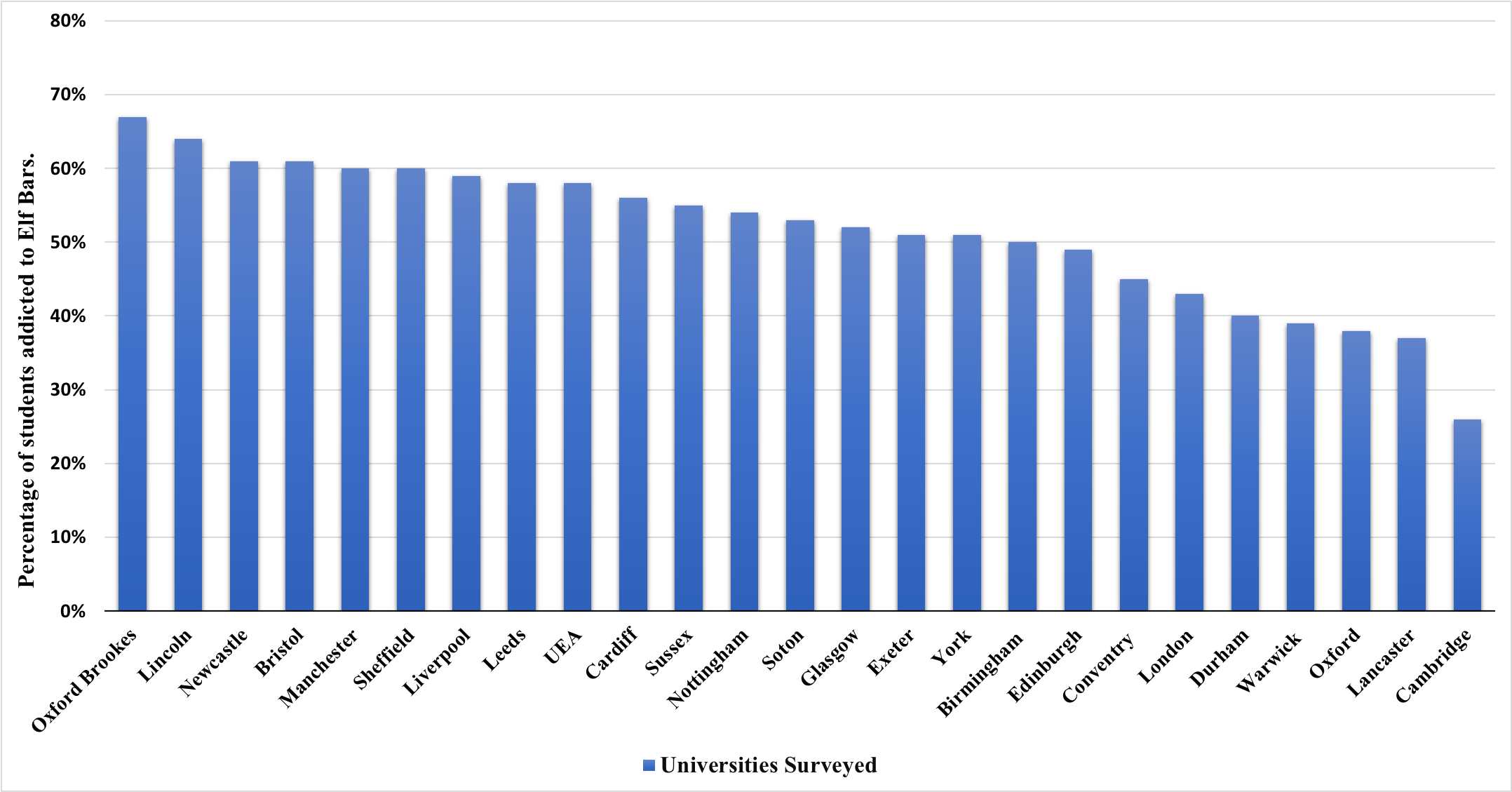No smoke without fire: is vaping a new pandemic?
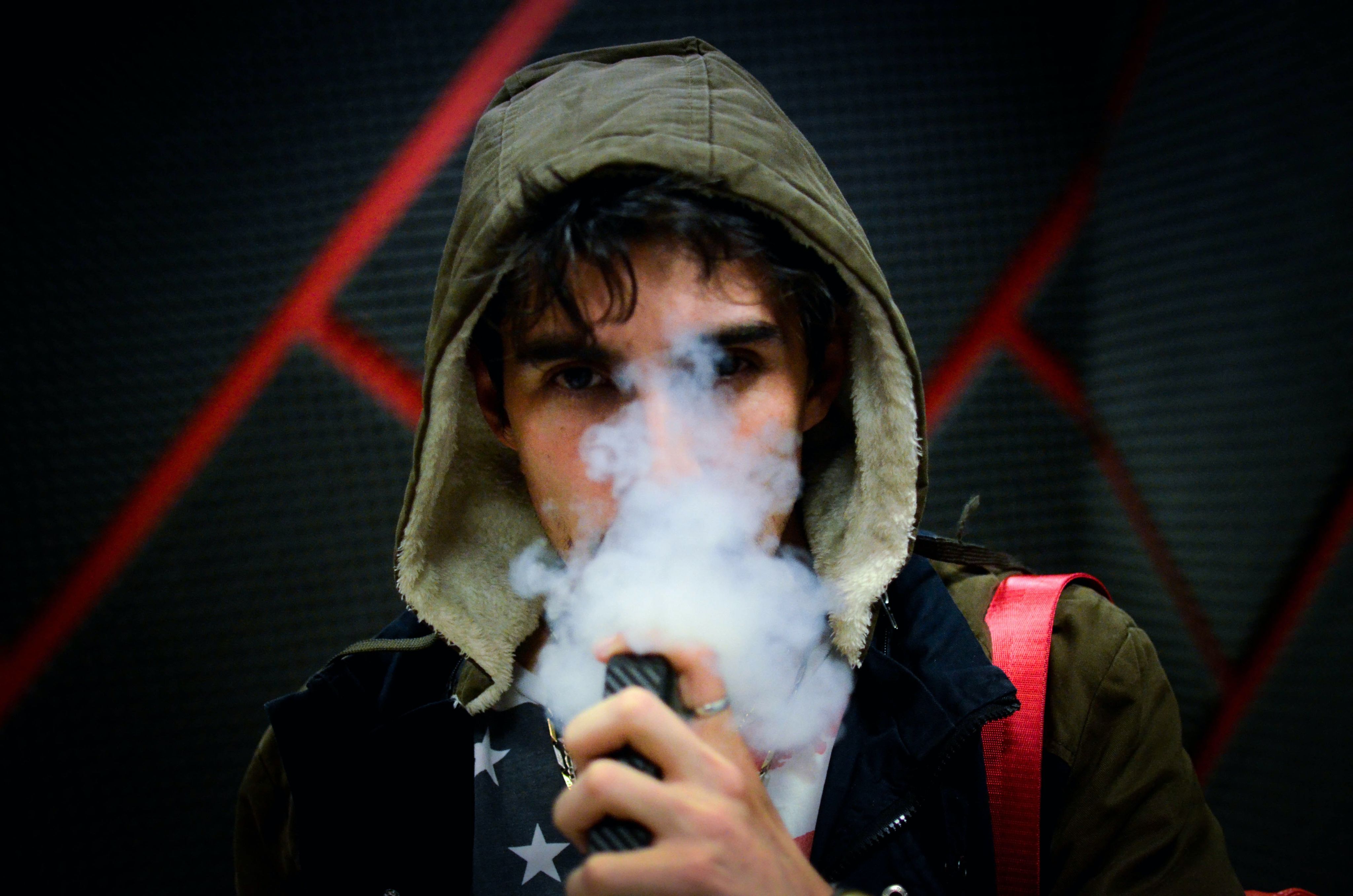
Clouds of fruit-scented smoke have enveloped the nation - all from various brands of e-cigarettes. While originally heralded as a safer alternative to smoking, vaping has since evolved into a major social trend, particularly amongst young people.
High street shop windows are now awash with these vibrant coloured disposable vape pens readily available in more flavours than ice cream. From festivals and nightclub smoking areas to car parks and outside local supermarkets, vapes are no longer just a nicotine replacement – they’re a fashion accessory.
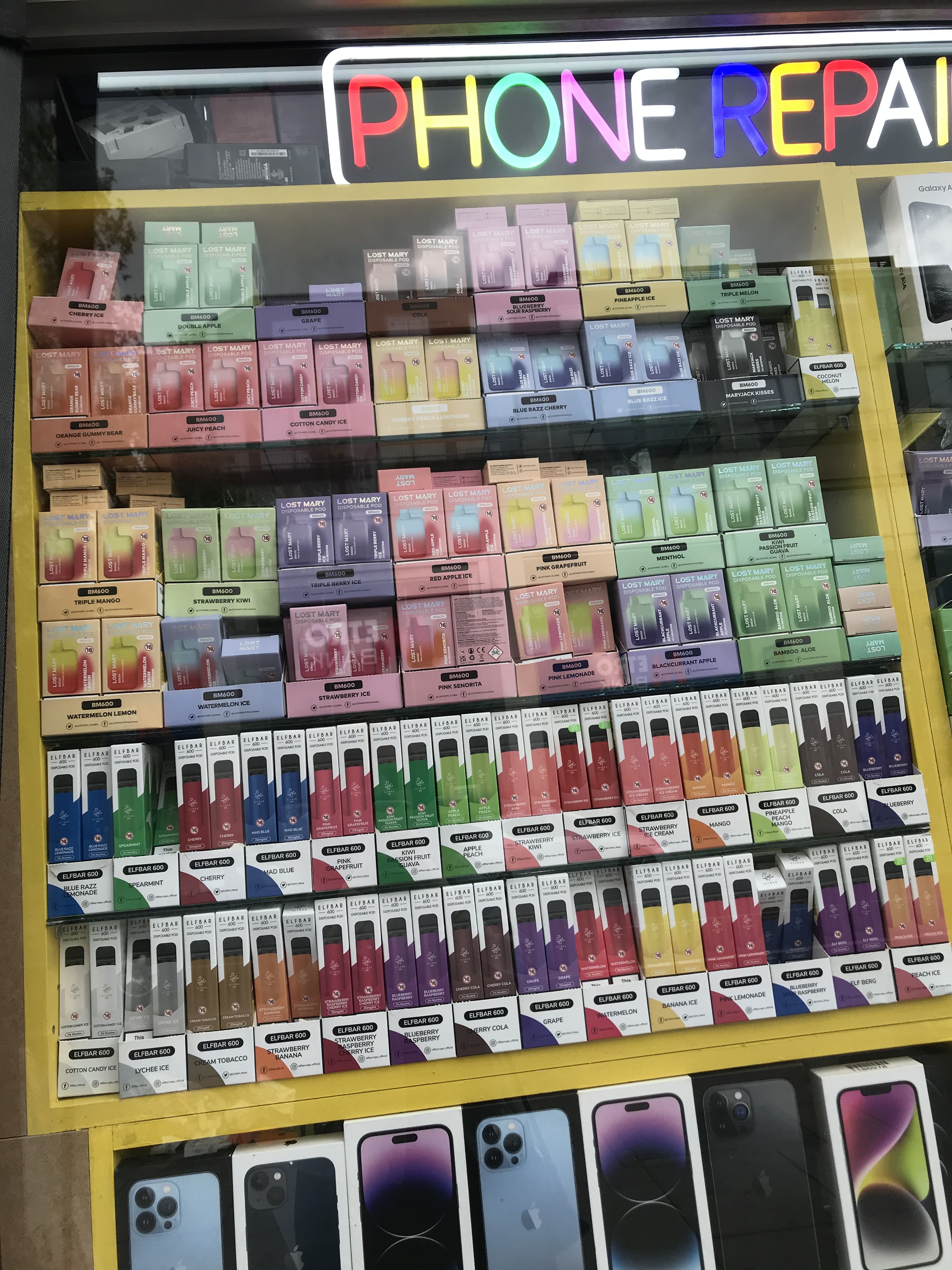
E-cigarette products at a store in London
E-cigarette products at a store in London
Demand has become so high that there is now mounting evidence of an illicit vaping trade primarily targeting young people. Dan Marchant, Director at the UK's largest vaping retailer, Vape Club and the Founding Member at UKVIA (UK Vaping Industry Association) said:
"The problem isn't the product, the problem is the people that sell them to children. We’ve seen a rise in unofficial sellers of e-cigarettes on social media platforms, predominantly used by a younger audience, such as TikTok. Our research last year found that there were around 205 unofficial accounts selling or advertising ElfBar devices, followed by up to half a million young people."
Data collected by the North East Trading Standards Association revealed more than 1.4 tonnes of illegal vapes had been seized in the last six months of 2022 in the North East of England alone. Some of the products seized were also lacking vital information including health and hazard warnings.
With this in mind, is the funky range of flavours and colourful advertising campaign a simple exercise of smoke and mirrors? Is this fashion accessory actually disguising the emergence of a serious physical and legal threat?
A Stark Reality Exposed Online:
In the past few months, there has been an alarming increase in online articles and social media posts about the potential health risks associated with vaping.
Mike Jones, medical and health author at Smart Fitness Edge said: “Research suggests that regular vaping can harm the cardiovascular system by causing heart attacks, strokes or hypertension due to nicotine's impact on blood pressure levels and vessel constriction after smoking or vaping sessions.”
He also added: “The chemical diacetyl in some vape juices has been linked to a rare lung disease called popcorn lung disease (bronchiolitis obliterans).”
The term “popcorn lung” has rapidly circulated news headlines after a 20-year-old woman claimed to have developed the rare respiratory condition due to a severe vaping addiction.
Before being hospitalised and given an official diagnosis, Abby Flynn of Milton Keynes, Buckinghamshire would get through at least one disposable a day, which is equivalent to 140 cigarettes a week. Expense-wise, this would accumulate to approximately £135 a month, with one disposable usually costing between £4 - £6.
While their longevity depends on how often a vaper uses them, each disposable pen provides approximately 600 puffs, which is the equivalent nicotine dosage of about 48 cigarettes.
The unfortunate reality is that vaping is so ubiquitous that many young adults like Abby feel compelled to join in because of peer pressure. One brand has particularly soared in popularity amongst young people - Elf Bars.
Manufactured in China, their compact design and pre-filled e-liquid make them a more practical alternative to normal disposable vapes and e-cigarettes.
A typical Elf Bar contains 20 mg of nicotine salt liquid infused into flavoured e-liquid and contained in a sealed tank with a built-in coil. This is accompanied by a built-in single-use 550mAh battery, large enough to vape all of the contained e-liquid.
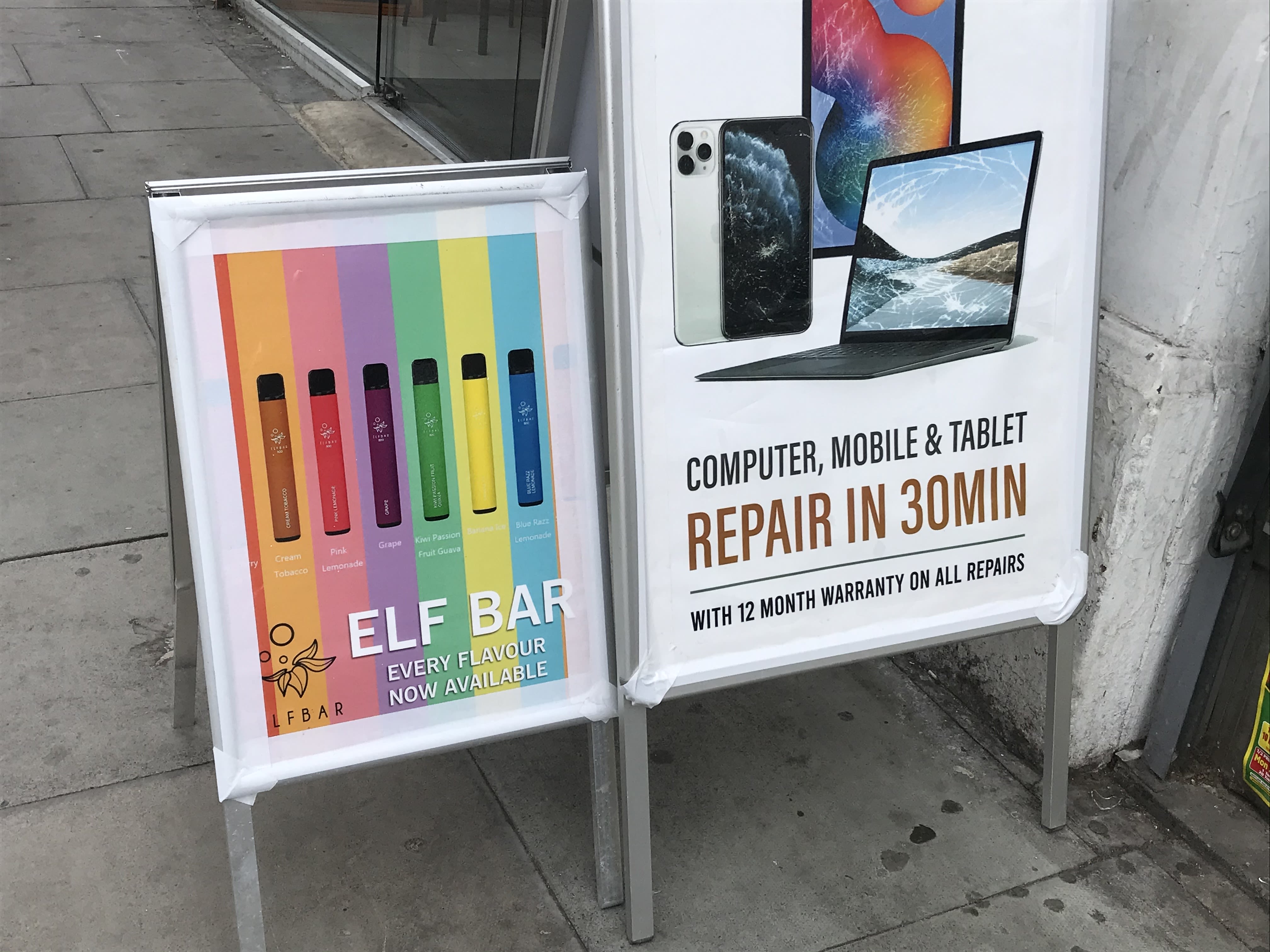
The Tab’s extensive investigation into Elf Bar usage confirms how vaping has become practically counterintuitive as a way to wean off smoking with many users having not even used cigarettes previously. Over 50 per cent of students surveyed said they were not previous smokers before using Elf Bars.
The survey also revealed that over a quarter of UK university students say they are addicted to Elf Bars. Out of that number, 41 per cent said they only used their Elf Bar in social settings compared to 36 per cent who admitted to using theirs daily and 23 per cent who said infrequently.
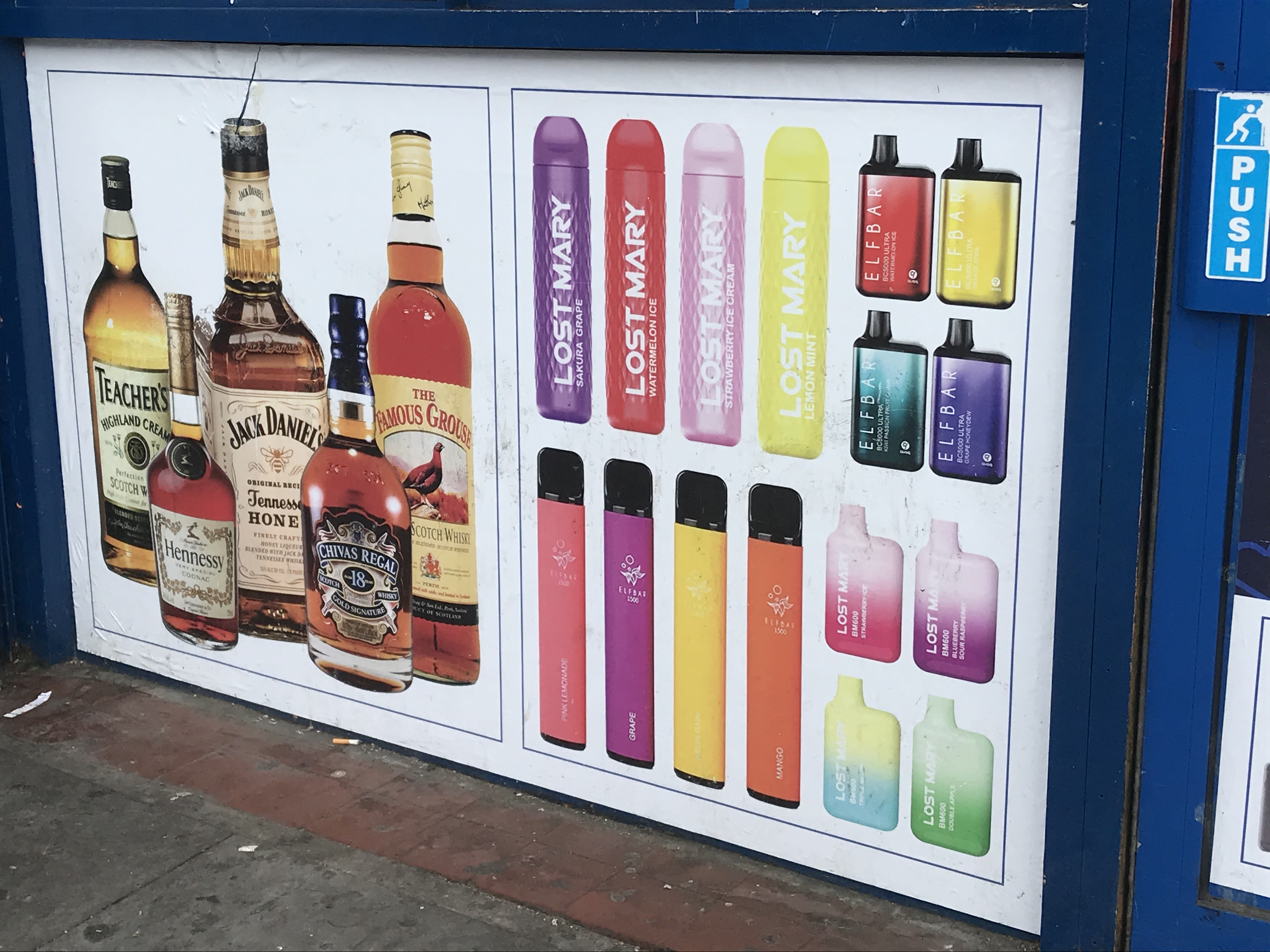
Like kids in a candy store:
So why, amidst with wealth of unnerving headlines surrounding the potential health risks, do young people still vape?
Whatever the product, it’s safe to say we all like a bit of variety to make our taste buds tingle. Flavour variety not only broadens the appeal of a product but also allows for a more eye-catching product range. Each of us subconsciously associate colour with a particular flavour such as pairing red with strawberries or blue with blueberries.
One young female user claims that the reasoning behind the exploding popularity of e-vapes amongst young people lies in the vibrant range of colours and tastes available for consumption.
“The flavours drew me in - that and all the different colours is what attracts young people to them.”
One TikTok user even created her own review series where she would give different vape flavours a rating out of 10.
This variety of fruity flavours is the crux of the advertising campaign as stated by Dan Marchant:
“Adults like flavours. People buy desserts, sweets and eat chocolate. People also like flavoured gin. Once you start to move away from smoking, for a huge percentage of people, you actually realise that the flavour of tobacco isn't that nice."
A Complete Ban?
With such a proliferation of use, and the mounting evidence of health risks associated with vaping is there any way of effectively regulating this issue?
Currently, there are 35 countries with vaping restrictions already in place. These vary from prohibiting vapes in public places to complete bans. Thailand has some of the strictest laws where users could be jailed for up to 10 years.
Australia will be the latest country to introduce a ban on recreational vaping in response to skyrocketing numbers of young people who buy and use vapes.
The country had already made it illegal to sell, supply, or possess an e-cigarette or any liquid that contains nicotine in Australia without a prescription. However, suppliers soon overcame this hurdle by removing “nicotine” from the ingredients list, even though the products still contain it.
By cracking down on this illegal market of vapes Australia's health minister Mark Butler aims to prevent new generations from being addicted to nicotine:
"Just like they did with smoking... 'Big Tobacco' has taken another addictive product, wrapped it in shiny packaging, and added sweet flavours to create a new generation of nicotine addicts"
The U.K. might be following in Australia's footsteps as last month the government announced plans to introduce tougher measures to combat youth vaping including the formation of a new ‘illicit vapes enforcement squad’.
Neil O’Brien, who is a junior health minister, said:
"The new illicit vapes enforcement squad will work across the country and clamp down on those businesses who sell vapes to children - which is illegal - and get them hooked on nicotine. Our call for evidence will also allow us to get a firm understanding of the steps we can take to reduce the number of children accessing and using vapes."
Vape Club not only backs the government's proposal, but he also expresses his intentions to introduce a licensing scheme to deter illicit vape sales to children. Marchant said:
"We have been campaigning for a couple of years now about having a retail licensing scheme and the money from this licensing scheme to actually fund a national test purchasing scheme to make sure that these rogue retailers that are happy to sell these products to children have a major deterrent. I think the fines at the moment are too low, it's about £2,500 and we think they should be at least £10,000 to really scare people away. "

